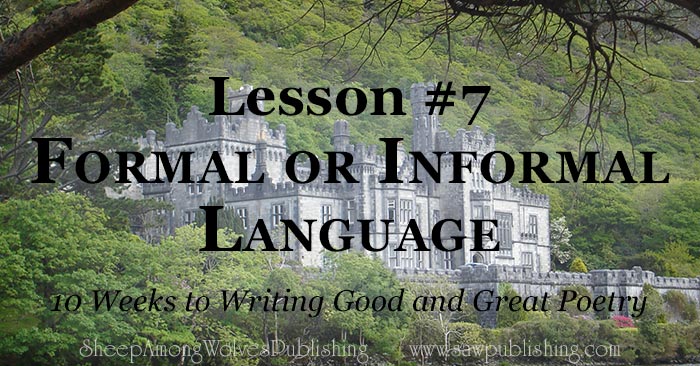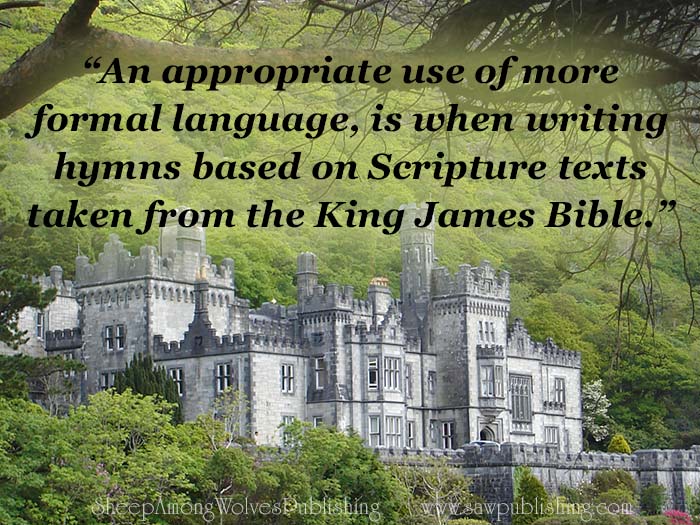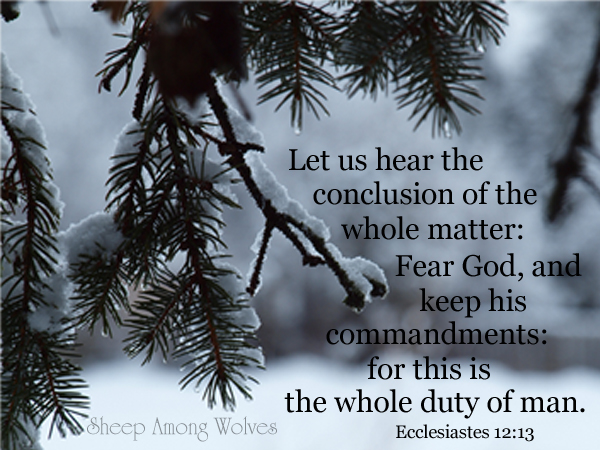Creating Impressions Through Formal or Informal Language
Sheep Among Wolves’ Good and Great Poetry Course was created to teach high school students how to write poems that are both good and great. This FREE 10-week course takes a look at some fundamental elements of poetical structure as well as the themes and subject-matter which really make up the soul of a poem. For a full explanation of the course, see our post entitled 10 Weeks to Writing Good and Great Poetry. To receive the course in 10 weekly email lessons, sign up here, or at the bottom of this post.

Here’s a piece of advice. Don’t fry bacon in the clothes you would wear to a wedding. It’s sure to end badly, and when it does few people will have any sympathy, because you should have known better than to wear that outfit while you cooked bacon. Perhaps this advice seems a little spontaneous, but the truth of the matter is, I was thinking of how often we use the wrong “clothing” in writing poetry. We try to wear our wedding clothes to fry bacon, or as the case may be, we show up at a wedding, without remembering to take off our apron, or change our shoes. We honour a casual subject with unbecoming formality, or leave a majestic subject to be treated with informality. It’s no wonder that there is a question over whether poetry should be written with formal or informal language—because one group of people is thinking about the wedding, and others about frying bacon. And the answer isn’t the same in both situations.
How We Speak Today
The way we speak today is really no gauge for the way we should write, because speaking and writing have very different needs. I remember an example from a writing course I encountered years ago, which talked about this difference. In the scene it described, a man comes home presumably from shopping for a specific article, and his wife asks him if he got it. He details a series of complications about getting the right kind, or the right colour, and it goes on from there. Never in the whole conversation do we find out precisely what they were talking about. That’s the way we talk, but it isn’t the way we should write.
So the real question becomes, where do you draw the line between the casual incompleteness of how we speak today, and the heavy formality of, say, the 1600’s?
You and Thee
One area of discussion with regard to formal and informal language is the use of the words “you” and “thee.” Originally, both of these words had their appropriate place in the English language. “Thou” and its counterpart “thee” formed the second person singular, and the now archaic “ye” and “you” were the plural—just like the difference between the third person singular “he/him” and plural “they/them” we still have today. Unfortunately, “thee,” “thou,” and “ye” have faded out of the English language, leaving us with a problem.
Many of the greatest English poems make use of an older style than people actually spoke when they were written. An older style gives a more timeless nature to a poem, which lends a good deal to the argument in favour of “thee”—but I realize that this doesn’t work for everything. There are some subjects which sound silly if you dignify them with grander words than they deserve. It’s okay to refer to a person, a concept, or even an object in nature as “thee,” but there are some subjects which aren’t timeless enough to be spoken of in timeless language.
Also, it is worthwhile to note that even in older-styled poems, “you” has its appropriate place—just be careful that you’re not using it in the wrong place. “Ye” fills the same position for the second-person plural as “he” for the third person singular. If you are having difficulty deciding whether “ye” or “you” is appropriate in a given sentence, try replacing it with “he.” If “he” fits it is an appropriate use of “ye”. Here is an easy way to remember it:
If “he” can do it, “ye” can do it too; if it happens to “him” it will also happen to “you.”
Using Older Language Without Sounding Archaic
A technique for avoiding a heavy, archaic sound in poetry, even with the use of “thee” and “thou”, is to avoid some of the other older words and word-endings. One way of doing this is to stay away from the parts of speech which require those endings. Take a look at this verse of the hymn “God of Our Strength,” and see how the author has used no words which require her to decide on an older or a more modern word ending. There are no “eths” and no “ests,” nor are there any verb-ending “s’s.” The author has no need to cross that bridge at all.
“God of our strength, enthroned above,
The source of life, the fount of love;
O let devotion’s sacred flame
Our souls awake to praise Thy name.
God of our strength, we wait on Thee,
Our sure defense forever be.”
Another way of doing this, is to avoid first person pronouns (thee and you) altogether, and in so doing there is less need to make decisions about some of the accompanying words.
Some hymn writers also choose to keep the more modern word endings, instead of avoiding those words altogether, while still using “thee” and “thou.” An example of this is in the hymn “For All the Saints.” In the last verse, see that the author uses “streams,” where the older form of the word would be “streameth,”even though God is always referred to as “Thee,” in this hymn.
For All the Saints
For all the saints who from their labours rest,
Who Thee by faith before the world confessed,
Thy Name, O Jesus, be forever blest.
Alleluia! Alleluia!
Thou wast their rock, their fortress, and their might;
Thou, Lord, their captain in the well-fought fight;
Thou, in the darkness drear, the one true Light.
Alleluia! Alleluia!
O may Thy soldiers, faithful, true, and bold,
Fight as the saints who nobly fought of old,
And win with them the victor’s crown of gold.
Alleluia! Alleluia!
O blest communion, fellowship divine!
We feebly struggle, they in glory shine;
Yet all are one in Thee, for all are Thine.
Alleluia! Alleluia!
And when the fight is fierce, the warfare long,
Steals on the ear the distant triumph song,
And hearts are brave again, and arms are strong.
Alleluia! Alleluia!
From earth’s wide bounds, from ocean’s farthest coast,
Through gates of pearl streams in the countless host,
Singing to Father, Son, and Holy Ghost,
Alleluia! Alleluia!
For the entire eleven-stanza hymn, click here.
The one place when this technique doesn’t really work is when the verb directly follows “thee” or “thou,” as in the second verse beginning “Thou wast their rock.” Despite the author’s choice to use the more modern word-ending elsewhere, he rightly decides to keep the older form here. “Thou was” or “thou were” has an awkward mistaken sound to it, because “thou wast” is the only appropriate match.
Interestingly to note, “est” appears to be the ending which is most archaic-sounding, and can give a heavy tone to poetry. “Thou hearest me” sounds so much heavier than “He heareth me,” whatever the reason is. But if you can avoid using words that end in “est,” there might be no need to cut out words ending in “eth” and even words like “art,” “hast” and “dost.”

King James Language—Psalms or Scriptural Allusion Themes
One place where it is absolutely appropriate to use all the older, archaic words, is when writing hymns based on Scripture texts taken from the King James Version of the Bible. Poems that quote or allude to these Scripture passages, not only are appropriate places for older language, but almost demand it to keep the style consistent. In the hymn “Unto the Hills Around“, which is a meterized version of Psalm 121, the author has kept much of the flavour of the original passage.
Take a look at the first verse:
“Unto the hills around do I lift up
My longing eyes:
O whence for me shall my salvation come,
From whence arise?
From God the Lord doth come my certain aid,
From God the Lord who heav’n and earth hath made.”
The phraseology and usage in this hymn reflect the language of the King James Bible far more than the truly archaic words.
Dressing Up for the Occasion
Be sure to change your poetical “clothes” as occasion requires. Don’t attempt to cut corners by frying your bacon after you’ve dressed for the wedding. You’ll only end up with confusion. The formality of your “good clothes” will suit the grander topics, and your apron will keep the poem from looking like grease-splattered wedding attire. It’s not that one is necessarily better than the other, it’s just that each is designed for its own purpose. Consider the impression you want to create with the reader, and then you can take the right outfit from your wardrobe for the purpose. Perhaps you will end up leaning toward one side or the other—some people are dressed more casually or more formally than others—but if you make an educated choice of language for each poem you write, you’ll find that your poetry is always properly “dressed” for the occasion.
To receive a PDF of the assignment for this lesson sign up below.
How To Sign Up
All ten poetry lessons can be found by clicking on the Poet’s Corner tab in the menu. If you would like to receive the course assignments as well, you can sign up below to have the lessons and assignments delivered by email over a ten week period.
This post may have been shared with the following linkups: The Art of Homemaking Mondays, Monday’s Musings, The Modest Mom, Homemaking Wednesdays, Wise Woman Linkup.
You might also like:

Nothing external, nothing of this world can supply the characteristic of a heart which is centred on Christ.
